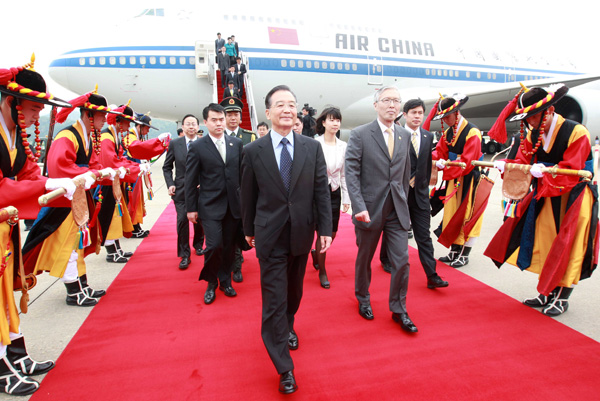Premier Wen in Seoul on official visit
 |
|
Chinese Premier Wen Jiabao arrives at the airport of Seoul on May 28, 2010, kicking off his three-day official visit to South Korea. [Xinhua] |
Chinese Premier Wen Jiabao arrived in Seoul on Friday, kicking off his three-day official visit to South Korea.
This is Wen's second visit to South Korea since 2007 and his first visit to the country since China and South Korea established strategic cooperative partnership in 2008.
Wen is also scheduled to attend the third trilateral summit of China, Japan and South Korea in the southern resort island of Jeju.
The Chinese premier will hold talks with South Korean President Lee Myung-bak later Friday, and will also meet with Speaker of the National Assembly Kim Hyong-o and Prime Minister Chung Un-chan during the visit.
South Korea is the first leg of Premier Wen's four-nation Asia tour, which will also take him to Japan, Mongolia and Myanmar.
Chinese Vice Foreign Minister Zhang Zhijun said at a news briefing ahead of Wen's visit that China hoped to speed up the establishment of the free trade area (FTA) with South Korea and increase cooperation in education, science, culture and tourism.
China also hoped to enhance communication and coordination with South Korea in international and regional affairs, Zhang said, adding that trade cooperation agreements would also be signed during Wen's visit.
Chinese Ambassador Zhang Xinsen said as good neighbors, China and South Korea had made joint efforts to achieve rapid and all-round development of the bilateral ties since the two countries established diplomatic relations in 1992.
Two-way cooperation had been broadened and enhanced, he said. China is the largest trade partner, export destination country and import market for South Korea, while South Korea is the third biggest trade partner for China.
The two countries also worked closely when the world was hit by the global financial crisis, Zhang said, citing the bilateral currency swap accord involving some 28 billion U.S. dollars, in an effort to safeguard regional and global financial stability.
 0
0 






